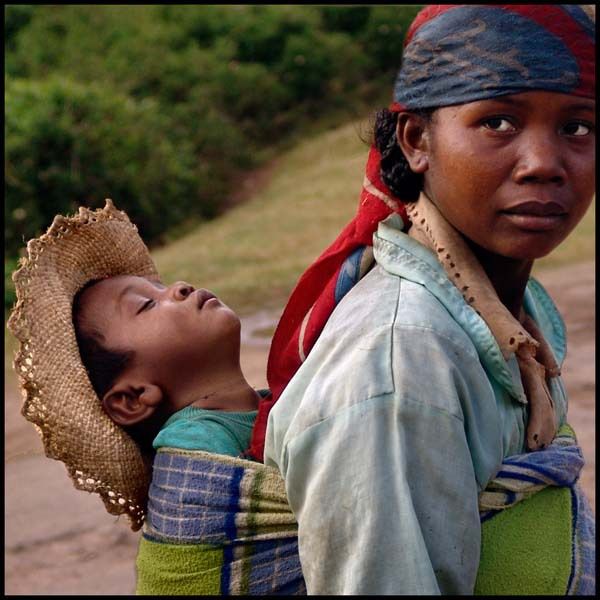Madagascar : les femmes et l'avortement illégal
1 Septembre 2019
INB1
INB1
Il faut franchir un portail en bois brinquebalant, traverser le petit potager de son quartier d’Antananarivo et là, le long d’un mur en briques rouges, derrière un enclos étroit de tôles ondulées plantées vers le ciel, se cache le secret de Volatiana.
“Lorsque je fais le compte, il y a environ huit foetus enterrés ici”, confie cette mère de famille malgache. Ainsi qu’un bébé né à sept mois de grossesse, ajoute-t-elle aussitôt. “Il criait lorsque je l’ai mis dans un sac plastique”.
Volatiana – son prénom a été modifié pour préserver son anonymat – les a tous portés.
Pourquoi quelqu'un qui n'a pas d'utérus, qui n'a pas de fille, qui n'a pas de femme a des lois à dicter aux femmes ?
Sur ce bout de terre qui ne laisse rien soupçonner de ses entrailles, elle soupire. “Ce que j’ai ressenti, c’est la délivrance (…) Avoir un autre bébé, ce serait l’enfer”.

A Madagascar, un pays majoritairement chrétien où le pape François est attendu vendredi prochain, l’avortement est illégal, y compris en cas de viol, et passible de dix ans de prison.
Mais avec six enfants à charge, une petite maison sans eau courante et un mari alcoolique, Volatiana “n’en peut plus”.
En cas de nouvelle grossesse, elle n’envisage qu’une seule décision: y mettre fin. Comme une femme sur quatre dans la Grande île, selon l’association Nifin’akanga, qui défend la légalisation de l’avortement.
Les femmes qui y recourent pratiquent en moyenne entre deux et huit avortements dans leur vie et sont issues de tous les milieux sociaux, précise l’une des fondatrices de l’ONG, Mbolatiana Raveloarimisa.
“Faiseuses d’ange”
Volatiana connaît plusieurs avorteuses – leurs noms ont été modifiés – ou “faiseuses d’ange”.
Dety, d’abord. Elle administre des tisanes de feuilles d’avocat, introduit dans le col de l’utérus une sonde ou une boule de nifin’akanga – une plante aux propriétés abortives – et prodigue des massages du bas ventre.

Lucie ensuite. La sage-femme retraitée pratique dans sa maison baignée d’odeurs d’urine, sur une bâche aux taches de sang séché. Après avoir prescrit des antispasmodiques, elle recueille le foetus, équipée d’un spéculum et d’une pince qui n’en finit pas.
Dety facture son intervention 10.000 ariary (2,5 euros), Lucie 200.000 ariary (50 euros).
Avec son salaire mensuel de 140.000 ariary, Volatiana a le plus souvent recours à Dety, sauf en cas de complications. Mais la procédure est longue – jusqu‘à trois jours – et très douloureuse.
“J’attends le vendredi pour aller avorter, comme ça je ne rate pas de jour de travail”, raconte la domestique menue de 44 ans.
“Le week-end, je continue chez moi à prendre des tisanes et à me masser le ventre”, explique-t-elle le visage crispé, souvenir des douleurs endurcies. “Quand je suis sur le point d’avorter, je demande à mes enfants de sortir jouer dehors.”
Dans ces conditions d’hygiène inexistantes, Volatiana “remercie Dieu d‘être encore en vie”. “Une fois j’ai avorté de jumeaux. J’ai failli mourir.”
“Hypocrisie”
A Madagascar, pays pauvre de 26 millions d’habitants, trois femmes meurent chaque jour des suites d’un “avortement spontané ou provoqué”, selon Lalaina Razafinirinasoa, responsable de l’association Marie Stopes.

Tous les ans, l’ONG prend en charge 20.000 victimes de complications d’un avortement pratiqué avec de la peau de banane roulée en boule, du nifin’akanga, un cintre, voire de l’eau de javel ou des cendres froides.
Outre les hémorragies et infections, “le plus grand risque est la perforation d’organes”, explique le Dr Anderson Randriambelomanana, chef de service à la maternité de l’hôpital Andohatapenaka, à Antananarivo.
Les hôpitaux publics prennent en charge ces complications. “Notre devoir est de soigner, pas de dénoncer”, plaide-t-il.
Une pure “hypocrisie”, s’indigne Mbolatiana Raveloarimisa. “Pourquoi ne pas prendre en charge les femmes avant ces complications, au lieu de les envoyer à l’abattoir ?”
Volatiana pourrait éviter ces cauchemars successifs avec un contraceptif. Mais une consultation, c’est une demi-journée de travail perdu, avance-t-elle.
La politique de planning familial à Madagascar, où le taux de fécondité dépasse 4 enfants par femme, est un échec. “Les barrières sont financières, culturelles et liées à la disponibilité des contraceptifs”, énumère Lalaina Razafinirinasoa.
Les hôpitaux publics en proposent bien gratuitement, mais l’offre est très insuffisante.
“Peurs et rumeurs”
Un cinquième des femmes qui souhaitent avoir accès à la planification en sont privées, selon Marie Stopes.

D’abord pour des raisons de coût. Un stérilet chez Marie Stopes coûte 2.000 ariary, un implant 5.000 ariary. “2.000 ariary, ce peut être la moitié du salaire journalier d’une vendeuse ambulante”, explique Lalaina Razafinirinasoa.
Et puis dans l’imaginaire malgache, les contraceptifs continuent à entretenir toutes les peurs. Pour de nombreuses femmes, ils font grossir ou provoquent paludisme et cancer.
( ENGLISH )
You have to cross a rickety wooden gate, cross the kitchen garden of his neighborhood of Antananarivo and there, along a red brick wall, behind a narrow enclosure of corrugated metal sheets planted towards the sky, hides the secret of Volatiana .
"When I do the count, there are about eight fetuses buried here," says this Madagascan mother. And a baby born at seven months of pregnancy, she adds immediately. "He was screaming when I put it in a plastic bag".
Volatiana - her name has been changed to preserve her anonymity - has all been worn.
Why does someone who does not have a uterus, who does not have a daughter, who does not have a wife have laws to dictate to women?
On this piece of earth that leaves nothing to suspect her entrails, she sighs. "What I felt was deliverance (...) To have another baby, it would be hell".

In Madagascar, a predominantly Christian country where Pope Francis is expected next Friday, abortion is illegal, including in cases of rape, and punishable by 10 years in prison.
But with six dependent children, a small house without running water and an alcoholic husband, Volatiana "can not take it anymore".
In case of a new pregnancy, she only plans one decision: to put an end to it. As one in four women on the Big Island, according to the association Nifin'akanga, which defends the legalization of abortion.
The women who use them practice on average between two and eight abortions in their lives and come from all social backgrounds, says one of the founders of the NGO, Mbolatiana Raveloarimisa.
"Angel Mowers"
Volatiana knows several abortionists - their names have been changed - or "angel makers".
Dety, first. She administers herbal tea of avocado leaves, introduced into the neck of the uterus a probe or a ball of nifin'akanga - a plant with abortifacient properties - and provides massages of the lower abdomen.
Lucie then. The retired midwife practices in her house bathed in urine smells on a tarpaulin with dried blood stains. After prescribing antispasmodics, she collects the fetus, equipped with a speculum and a clip that never ends.

Dety invoices his intervention 10.000 ariary (2.5 euros), Lucie 200.000 ariary (50 euros).
With her monthly salary of 140,000 Ariary, Volatiana most often uses Dety, except in case of complications. But the procedure is long - up to three days - and very painful.
"I'm waiting for Friday to have an abortion, so I do not miss a day of work," says the 44-year-old maid.
"On weekends, I go home to take herbal teas and massage my stomach," she says the face tense, memory of hardened pain. "When I'm about to have an abortion, I ask my kids to go out and play outside."
In these non-existent hygienic conditions, Volatiana "thanks God for being alive". "Once I had abortions of twins. I almost died."
"Hypocrisy"

In Madagascar, a poor country of 26 million inhabitants, three women die each day following a "spontaneous or induced abortion," according to Lalaina Razafinirinasoa, head of the Marie Stopes association.
Every year, the NGO takes care of 20,000 victims of complications of an abortion practiced with banana skin rolled into a ball, nifin'akanga, hanger or even bleach or cold ashes.
In addition to haemorrhages and infections, "the biggest risk is organ perforation," says Dr. Anderson Randriambelomanana, head of maternity ward at Andohatapenaka Hospital in Antananarivo.
Public hospitals deal with these complications. "Our duty is to heal, not to denounce," he pleads.
A pure "hypocrisy", indignant Mbolatiana Raveloarimisa. "Why not take care of women before these complications, instead of sending them to the slaughterhouse?"

Volatiana could avoid these successive nightmares with a contraceptive. But a consultation is half a day of work lost, she says.
The family planning policy in Madagascar, where the fertility rate exceeds 4 children per woman, is a failure. "The barriers are financial, cultural and related to the availability of contraceptives," Lalaina Razafinirinasoa lists.
Public hospitals offer good for free, but the offer is very insufficient.
"Fears and rumors"
One fifth of women who want to access planning are deprived of it, according to Marie Stopes.
First for cost reasons. An IUD at Marie Stopes costs 2,000 ariary, a 5,000 ariary implant. "2,000 ariary, it can be half of the daily wage of a street vendor", explains Lalaina Razafinirinasoa.
And then in the Malagasy imaginary, contraceptives continue to maintain all fears. For many women, they make you fat or cause malaria and cancer.

/image%2F2644156%2F20230522%2Fob_8664ae_img-1834.jpeg)
/image%2F2644156%2F20190901%2Fob_cdd987_unknown.jpg)
/image%2F2644156%2F20190901%2Fob_877175_hqdefault.jpg)
/image%2F2644156%2F20190901%2Fob_54858d_famille-malgache-0.jpg)
/image%2F2644156%2F20190901%2Fob_906b83_gettyimages-148938871-0.jpg)
/image%2F2644156%2F20190901%2Fob_b666bc_ob-730b52-whatsapp-image-2019-06-03-at.jpg)


/image%2F2644156%2F20211113%2Fob_114308_20211111-070542.jpeg)
/image%2F2644156%2F20211024%2Fob_a88d9d_images.jpeg)
/image%2F2644156%2F20211024%2Fob_67f655_maxresdefault.jpeg)
/image%2F2644156%2F20211024%2Fob_3dfeb5_fally-ipupa-king.jpeg)